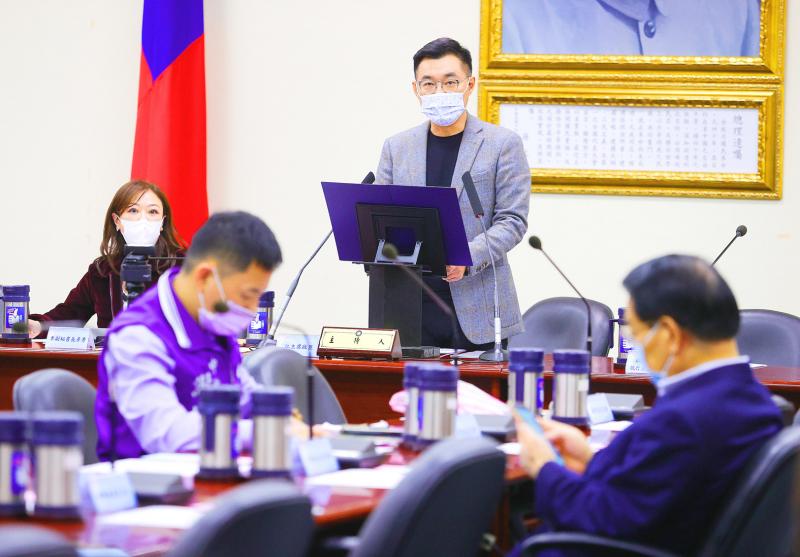The Chinese Nationalist Party (KMT) yesterday called for a firmer response from the government to Japan’s decision to release processed wastewater from the Fukushima Dai-ichi nuclear power plant into the ocean.
The decision to begin discharging the wastewater into the ocean in two years was announced by the Japanese government on Tuesday.
If the water is not treated properly, it would contaminate the entire marine ecosystem and affect the rights of the nation’s fishers, KMT Culture and Communications Committee director-general Alicia Wang (王育敏) told a news conference in Taipei.

Photo: CNA
It might also make Taiwanese feel uneasy about consuming aquatic products and cast another shadow over food safety in the nation, she said.
Unlike international organizations such as Greenpeace or Japan’s other neighbors such as South Korea, the Presidential Office and the Executive Yuan “have not dared to speak loudly in protest” of the situation, Wang said.
She accused President Tsai Ing-wen’s (蔡英文) administration of having “seriously neglected” its duty to defend the nation’s food safety, citing its decision in August last year to allow imports of US pork containing traces of the animal feed additive ractopamine, and its lack of a firm condemnation with regard to Tokyo’s latest decision.
The government’s response to Japan’s plans to release the wastewater into the ocean has been “too weak,” Wang said, urging the Tsai administration to “toughen up.”
The KMT urges the government to express the nation’s “solemn stance” on the issue and to lodge a protest with Japan, she said.
“We support maintaining positive and friendly relations between Taiwan and Japan, but when faced with national interests, including the dispute over the Diaoyutais (釣魚台列嶼), we should not yield one inch,” committee deputy director-general Huang Tzu-che (黃子哲) said.
When faced with important issues of food safety and health, including food or water contaminated with radiation, “we should not yield a single step,” Huang added.
Representative to Japan Frank Hsieh (謝長廷) should faithfully convey to the Japanese government the nation’s opposition to the release of the wastewater into the ocean, Wang said.
The government should lodge a firm protest with the Japanese government to defend the nation’s food safety, and the rights and interests of the nation’s fishers, as well as protect the safety of waters surrounding Taiwan, she said.
Democratic Progressive Party (DPP) spokeswoman Hsieh Pei-fen (謝佩芬) accused the KMT of having a “split personality,” as it is protesting Japan’s decision while also calling for the activation of the Fourth Nuclear Power Plant in New Taipei City’s Gongliao District (貢寮).
As the government has already clearly stated, the Ministry of Foreign Affairs, Council of Agriculture and other agencies have expressed concern about the plan to Tokyo many times, Hsieh said, adding that the Atomic Energy Council (AEC) has also expressed its formal opposition.
The DPP has always opposed nuclear power and has vigorously promoted the nation’s energy transition under the “nuclear-free homeland” policy, she said.
“Unfortunately, we are once again seeing the KMT blow things out of proportion for political gain,” Hsieh said.
The KMT tried to imply that the AEC only expressed regret over Tokyo’s decision, but in reality, it voiced opposition before the decision was even made, and is also demanding that Japan furnish all information on safety measures, she said.
While the DPP’s stance is clear, the KMT’s is contradictory, Hsieh said.
“If the KMT is opposed to Japan’s dumping of nuclear wastewater, then how can it support starting the Fourth Nuclear Power Plant, which would produce nuclear waste?” she asked.
Additional reporting by Chien Hui-ju

Beijing could eventually see a full amphibious invasion of Taiwan as the only "prudent" way to bring about unification, the US Department of Defense said in a newly released annual report to Congress. The Pentagon's "Annual Report to Congress: Military and Security Developments Involving the People's Republic of China 2025," was in many ways similar to last year’s report but reorganized the analysis of the options China has to take over Taiwan. Generally, according to the report, Chinese leaders view the People's Liberation Army's (PLA) capabilities for a Taiwan campaign as improving, but they remain uncertain about its readiness to successfully seize

Taiwan is getting a day off on Christmas for the first time in 25 years. The change comes after opposition parties passed a law earlier this year to add or restore five public holidays, including Constitution Day, which falls on today, Dec. 25. The day marks the 1947 adoption of the constitution of the Republic of China, as the government in Taipei is formally known. Back then the Chinese Nationalist Party (KMT) governed China from Nanjing. When the KMT, now an opposition party in Taiwan, passed the legislation on holidays, it said that they would help “commemorate the history of national development.” That

Trips for more than 100,000 international and domestic air travelers could be disrupted as China launches a military exercise around Taiwan today, Taiwan’s Civil Aviation Administration (CAA) said yesterday. The exercise could affect nearly 900 flights scheduled to enter the Taipei Flight Information Region (FIR) during the exercise window, it added. A notice issued by the Chinese Civil Aviation Administration showed there would be seven temporary zones around the Taiwan Strait which would be used for live-fire exercises, lasting from 8am to 6pm today. All aircraft are prohibited from entering during exercise, it says. Taipei FIR has 14 international air routes and

The Ministry of National Defense (MND) today released images of the military tracking China’s People's Liberation Army (PLA) movements during the latest round of Chinese drills around Taiwan. The PLA began "Justice Mission 2025" drills today, carrying out live-fire drills, simulated strikes on land and maritime targets, and exercises to blockade the nation's main ports. The exercises are to continue tomorrow, with the PLA announcing sea and air space restrictions for five zones around Taiwan for 10 hours starting from 8:30am. The ministry today released images showing a Chinese J-16 fighter jet tracked by a F-16V Block 20 jet and the